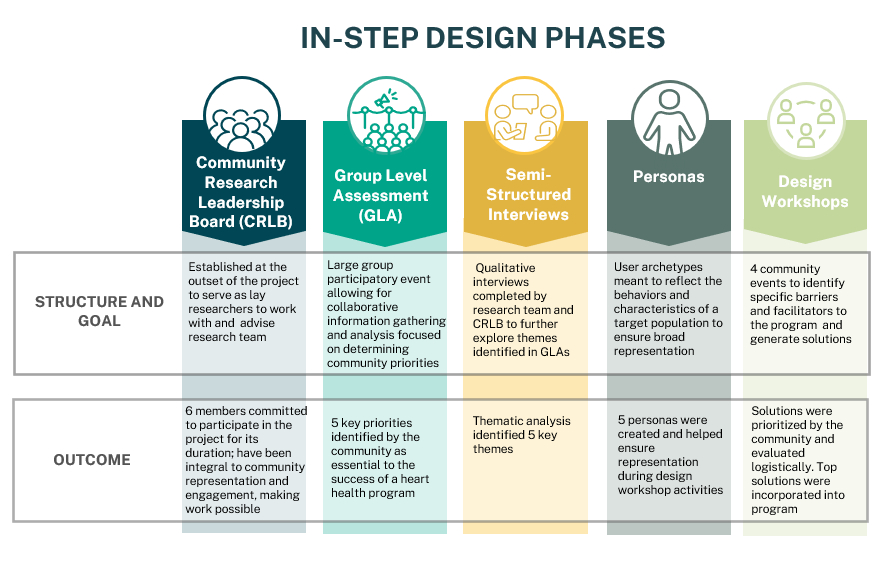Final ID: Mo1100
Partnering With an American Indian Community to Co-Design a Structural Heart Disease Program to Improve Cardiac Care
Abstract Body (Do not enter title and authors here): Introduction:
American Indians are disproportionately impacted by cardiovascular disease. Furthermore, echocardiographic screening within one American Indian Tribe demonstrated ~6% of Tribal members had undiagnosed structural heart disease (SHD). Strategies for scale up of SHD screening are needed to improve earlier diagnosis and outcomes.
Aim:
Partner with the community to co-develop a scalable model to enhance SHD diagnosis, care, and outcomes that is culturally and contextually relevant for the partnering Tribe.
Methods:
We utilized a five-phase community-based participatory research approach outlined in Figure 1.
Results:
A five-member community research leadership board was established to bridge the gap between our research team and the community, in order to increase acceptability and program sustainability. Four group level assessment (GLA) sessions included 163 community members and identified the following five priorities as essential to a SHD program: 1) heart health/ SHD education and awareness; 2) cultural considerations; 3) inclusive, multigenerational community engagement; 4) improved resources for general health and wellness; and 5) accessible, patient-centered healthcare with local cardiac care. Follow-up semi-structured interviews were conducted with 19 community members. Thematic analysis identified key program needs including: 1) system considerations; 2) program considerations; 3) resources; 4) community awareness; 5) individual considerations/factors. Five personas were created based on emergent themes from the interviews: The Skeptic, The Hard-to-Reach, The Health Enthusiast, The Community Connector, and The Cultural/Tribal Champion. These personas were validated in community design workshops and used to identify barriers and facilitators of a SHD program, generate solutions to identified barriers, and prioritize program components based on impact and feasibility.
Conclusions:
We partnered with one Tribe to identify and co-develop the relevant and impactful components for an SHD program. Next steps include testing of programmatic implementation to understand reach, effectiveness, adoption, implementation, and maintenance.
American Indians are disproportionately impacted by cardiovascular disease. Furthermore, echocardiographic screening within one American Indian Tribe demonstrated ~6% of Tribal members had undiagnosed structural heart disease (SHD). Strategies for scale up of SHD screening are needed to improve earlier diagnosis and outcomes.
Aim:
Partner with the community to co-develop a scalable model to enhance SHD diagnosis, care, and outcomes that is culturally and contextually relevant for the partnering Tribe.
Methods:
We utilized a five-phase community-based participatory research approach outlined in Figure 1.
Results:
A five-member community research leadership board was established to bridge the gap between our research team and the community, in order to increase acceptability and program sustainability. Four group level assessment (GLA) sessions included 163 community members and identified the following five priorities as essential to a SHD program: 1) heart health/ SHD education and awareness; 2) cultural considerations; 3) inclusive, multigenerational community engagement; 4) improved resources for general health and wellness; and 5) accessible, patient-centered healthcare with local cardiac care. Follow-up semi-structured interviews were conducted with 19 community members. Thematic analysis identified key program needs including: 1) system considerations; 2) program considerations; 3) resources; 4) community awareness; 5) individual considerations/factors. Five personas were created based on emergent themes from the interviews: The Skeptic, The Hard-to-Reach, The Health Enthusiast, The Community Connector, and The Cultural/Tribal Champion. These personas were validated in community design workshops and used to identify barriers and facilitators of a SHD program, generate solutions to identified barriers, and prioritize program components based on impact and feasibility.
Conclusions:
We partnered with one Tribe to identify and co-develop the relevant and impactful components for an SHD program. Next steps include testing of programmatic implementation to understand reach, effectiveness, adoption, implementation, and maintenance.
More abstracts on this topic:
A pilot interprofessional stroke education program trains students to plan and implement culturally tailored community-based stroke education.
Hellerslia Van, Bides Zachary
Barriers to Research Participation: The Impact of Race, Education, and Socioeconomic Status in a Diverse Urban PopulationMueller Anna Sophie, Berman Brandon, Jafri Komail, Bonilla Harrison, Contreras Johanna

